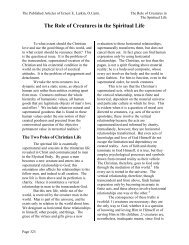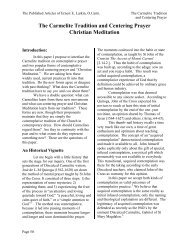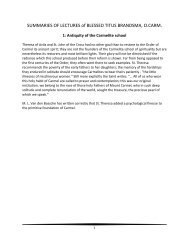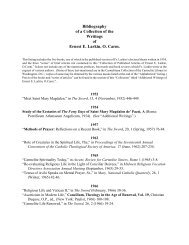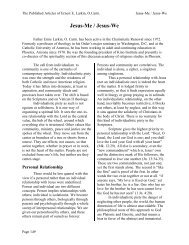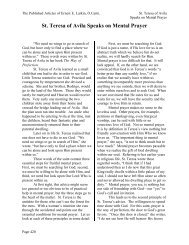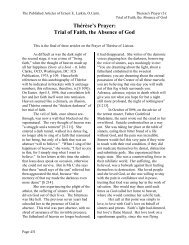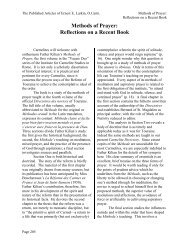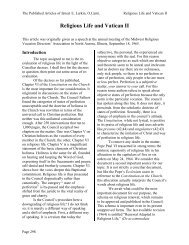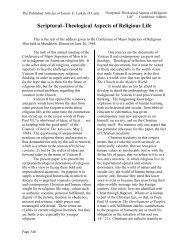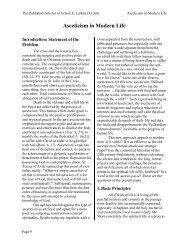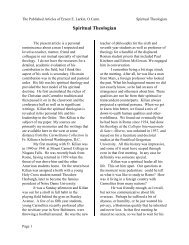Christian Spirituality - Carmelnet
Christian Spirituality - Carmelnet
Christian Spirituality - Carmelnet
You also want an ePaper? Increase the reach of your titles
YUMPU automatically turns print PDFs into web optimized ePapers that Google loves.
The Published Articles of Ernest E. Larkin, O.Carm. <strong>Christian</strong> <strong>Spirituality</strong><br />
The spiritual life is the <strong>Christian</strong> life<br />
lived with some intensity. It is the serious<br />
response of man to the revelation of God’s<br />
love in Christ and consists in loving<br />
knowledge and service of God and one’s<br />
fellow men in the Mystical Body of Christ.<br />
<strong>Christian</strong> spirituality begins when God’s word<br />
is accepted in faith. It manifests itself in the<br />
expression and the development of the love of<br />
God in prayer and action. It is the subjective<br />
assimilation and living in charity of the<br />
objective, theological realities of revelation.<br />
Since its object, origin and goal is God<br />
in His personal life, <strong>Christian</strong> spirituality is<br />
interpersonal; it is the life of man with God.<br />
Men are given this new relationship with the<br />
Trinity gratuitously, and they express it in acts<br />
that are at once human and transcendent. The<br />
open, free, and in some sense unlimited<br />
human spirit can express itself only in<br />
dependence on the material, the finite and<br />
particular, hence little-by-little and in time.<br />
This particularized condition of existence is<br />
reinforced in <strong>Christian</strong>ity by the fact that grace<br />
is union with an historical person, Christ (Acts<br />
2.38), and a participation in the sacred events<br />
called mysteries in His life. At the same time<br />
the new life in Christ is trans-historical and<br />
supernatural (Gal 2.20); it is nothing less than<br />
the life of the Holy Spirit, the Spirit of the<br />
Son, in man (Rom 8.14-16).<br />
This brief identification of <strong>Christian</strong><br />
spirituality has three distinguishing features<br />
that will be examined separately. They are the<br />
interpersonal, the historical, and the<br />
transcendent aspects of <strong>Christian</strong> spirituality.<br />
Interpersonal Life<br />
The meaning of interpersonal life can<br />
best be examined by considering the<br />
encounter with which it begins and the<br />
community or fellowship of life that follows.<br />
Page 75<br />
<strong>Christian</strong> <strong>Spirituality</strong><br />
Encounter. Men as children of Adam<br />
are born estranged from God. <strong>Christian</strong><br />
spirituality begins for them with their<br />
encounter with God who comes to them in<br />
Christ. This encounter is not a mere<br />
psychological construction, like an imagined<br />
visit with an absent person. The encounter is<br />
primarily ontological, founded on the real<br />
objective, superconscious union with God in<br />
grace (Gal 3.2-5). But encounter in the<br />
spiritual life is more than ontological union. It<br />
is the intellectual and affective realization of<br />
the I-thou relationship of grace as well, the<br />
conscious experience of God who calls in love<br />
and is answered in faith. This experience or<br />
consciousness is not necessarily immediate<br />
and direct, like the feeling of God’s presence<br />
in the classical mystical experience of God. It<br />
takes many forms, but basically it is an<br />
awareness and conviction that God is a<br />
person, that He is real and His love is real, and<br />
that this love freely accepted makes man a<br />
friend of God sharing God’s own life.<br />
<strong>Christian</strong> spirituality is neither abstract<br />
knowledge nor mere moralism (1 Cor 13.1-3).<br />
It is not a human system of self-perfection,<br />
even in the moral or religious order, nor a<br />
program of psychological conditioning to<br />
induce certain “states of soul.” <strong>Christian</strong><br />
spiritual life involves knowledge, moral effort,<br />
and spiritual exercises, but essentially it is a<br />
person-to-person contact between God who<br />
speaks to man in His Word and man who<br />
responds in the Word in loving faith (1 Thes<br />
2.13). It is a dialogue with God in love—life<br />
with the Father, in the Son, through the Holy<br />
Spirit. The spiritual life is eternal life and<br />
consists in knowledge and love of the Father<br />
and the Son (Jn 17.3) and in living as sons in<br />
the Son in fraternal love (1 Jn 4.7-8; Jn 15.4-<br />
10).<br />
The personal response to God in faith<br />
and love is the “theologal” life, the concrete
The Published Articles of Ernest E. Larkin, O.Carm. <strong>Christian</strong> <strong>Spirituality</strong><br />
expression of the theological virtues. The<br />
theologal life can be compared to the moral or<br />
ascetical life as later and earlier stages of<br />
spiritual growth, corresponding to the ancient<br />
distinction between contemplative and active<br />
life. Such stages describe states of soul in<br />
which either the theological or the moral<br />
elements are more obvious, but both elements<br />
are part of every degree of spirituality.<br />
Otherwise there would be the error of<br />
psychologism or moralism, both of which are<br />
counterfeit spirituality. The first consists in a<br />
superficial consciousness of God<br />
independently of the orientation of faith, hope,<br />
and charity, which may or may not be present.<br />
This is more akin to aesthetic feeling than to<br />
true religion. Moralism is moral effort without<br />
relation to God. In authentic <strong>Christian</strong><br />
spirituality, the theological virtues unite the<br />
soul with God, while moral virtues dispose for<br />
this union by removing obstacles and by<br />
executing the commands of love. Moral<br />
virtues purify spiritual vision by allowing the<br />
light of faith to enlighten and manifest the<br />
Mystery of Christ (Eph 4.17-24); at the same<br />
time they strengthen the capacity for personal<br />
commitment and love by removing voluntary<br />
self-centered attachments that close the soul to<br />
God.<br />
For the <strong>Christian</strong> there is no value in<br />
pure asceticism, unrelated to friendship with<br />
God, or in a self-redemptive, external<br />
observance of the law. The law in fact is a<br />
shackle if it is performed for its own sake<br />
(Rom 7.13-23). <strong>Christian</strong> law supplies<br />
guidelines only and exists because of the<br />
imperfect spiritualization of the faithful. The<br />
local dynamism of the <strong>Christian</strong> life is found<br />
not in particular forms or laws, but in charity<br />
and the Holy Spirit, who leads the sons of God<br />
in perfect freedom (Rom 8.14-16). But<br />
virtuous works are the good fruit produced by<br />
the Holy Spirit and a Witness to His presence<br />
(Gal 5.22-26). The Church today wisely<br />
interprets heroic virtue to be proved by the<br />
constant and faithful fulfillment of duty. It<br />
Page 76<br />
reasons that given the weakness and instability<br />
of fallen man, only the gifts of the Holy Spirit<br />
are a sufficient explanation of perfect<br />
perseverance in good works [Gabriel of St.<br />
Mary Magdalen, “Present Norms of<br />
Holiness,” in Conflict and Light (New York<br />
1952) 154-169].<br />
Community. Man encounters God in<br />
the Word of God (1 Thes 2.13). The Word is<br />
not only the saving actions of God, apostolic<br />
preaching, or the inspired accounts in Sacred<br />
Scripture; it is especially and above all Christ<br />
Himself, the Substantial Word of the Father<br />
(Jn 1.14; 6.35, 54). He is the living Word that<br />
vivifies and brings to fulfillment the words<br />
and acts of the past and in Whom in the<br />
economy of his redemption man makes his<br />
personal response to God’s love. Concretely<br />
the Word comes to us through the Church; the<br />
Church is the fundamental sacrament<br />
revealing and communicating the Word to<br />
men.<br />
The consequences of this truth in the<br />
spiritual life are manifold, as will be seen in<br />
the next section. Here one central implication<br />
is singled out, the fact that encounter with God<br />
occurs in community, in the fellowship of<br />
Christ’s Body, the Church.<br />
The Christ in whom men meet the<br />
Father is not the Christ of memory alone, but<br />
one who lives on mystically and sacramentally<br />
in His followers (Acts 9.5; 1 Cor 8.11-13).<br />
The Church is Christ acting now, sanctifying<br />
men and offering men access to the Father<br />
(Eph 2.18). The Church is constantly reliving<br />
the life of Christ, especially the paschal<br />
mystery of “passing over” to the Father (cf. Jn<br />
13.1; 1 Cor 5.7). Liturgically it makes present<br />
this passage, and historically its members<br />
recapitulate in their own lives the journey<br />
from sin to grace.<br />
Life with the Father is life in the Son;<br />
life in the Son is a communal existence with<br />
other sons in the Son, hence with one’s<br />
brothers. An individualistic God-and-I<br />
relationship is foreign to an informed
The Published Articles of Ernest E. Larkin, O.Carm. <strong>Christian</strong> <strong>Spirituality</strong><br />
<strong>Christian</strong> consciousness. Liturgical life, the<br />
source and summit of <strong>Christian</strong> life, is<br />
communal by nature, since the liturgy is the<br />
Mystical Body, Head and members together,<br />
worshiping the Father and sanctifying men.<br />
Private prayer likewise demands fraternal<br />
unity (Mt 5.23-24). Charity itself is<br />
necessarily social, since the same one virtue is<br />
exercised toward God and toward one’s<br />
fellowmen (Mt 25.35-40). The <strong>Christian</strong><br />
cannot afford to seek the transcendent God in<br />
contemplation and avoid Him in those who<br />
share His life. God dwells among men (Jn<br />
1.14) as well as in inaccessible light (1 Tm<br />
6.16), and neither presence can be neglected<br />
without compromising <strong>Christian</strong> life. This<br />
does not automatically spell out the forms the<br />
engagement to one’s fellowmen will take. The<br />
call may be to silence and solitude in<br />
canonical contemplative life, which according<br />
to Pope Pius XII is “intrinsically apostolic”<br />
[ActApS 43 (1951) 32]. Or it may be a<br />
vocation to social action in the world.<br />
Whatever the vocation there is no<br />
sanctification independently of the visible<br />
community and no love of God without a<br />
genuine, personal love of neighbor, for “if<br />
anyone says he loves God and hates his<br />
brother, he is a liar” (1 Jn 4.20).<br />
Historical Nature<br />
<strong>Christian</strong>ity is a historical religion; it is<br />
a Person (Christ) and His saving deeds (Acts<br />
10.37-42), especially His death and<br />
Resurrection, the paschal mystery, before it is<br />
a philosophy or a theology. Only by union<br />
with that Person through faith and Sacrament,<br />
only by reliving and assimilating the sacred<br />
events of His life, does the <strong>Christian</strong> make<br />
contact with God, undergo the transforming<br />
influence of grace, and achieve perfect<br />
friendship with God. From this point of view<br />
<strong>Christian</strong> spirituality is the living of the<br />
mystery of Christ.<br />
The Mystery of Christ. St. Paul calls<br />
the full divine plan revealed in the New<br />
Page 77<br />
Testament the mystery of Christ (Col 1.25-27;<br />
Eph 1.8-10; Rom 16.25-27). This mystery is<br />
Christ in His personal identity and in saving<br />
acts, especially the paschal mystery of His<br />
death and Resurrection. Salvation history<br />
culminates in the paschal mystery. Its final act<br />
will be the Parousia, the unveiling of the<br />
mystery. In the present time, between the<br />
Ascension and the Second Coming, the<br />
mystery of Christ consists in the subjective<br />
application of Christ’s work to men. The<br />
mystery now is the Risen Christ, who having<br />
been lifted up on the cross draws all men and<br />
all creation to Himself (Jn 12.32). It is “Christ<br />
in you, your hope of glory” (Col 1.27).<br />
In a certain trans-historical sense<br />
<strong>Christian</strong>s are already redeemed (Rom 8.24-<br />
25; 31-39). The baptized have gone down into<br />
the tomb with Christ and died to sin; they have<br />
risen with Christ to newness of life (Rom 6.2-<br />
11). Union with Christ glorified is so vivid in<br />
Paul’s mind that he sees his fellow <strong>Christian</strong>s<br />
already enjoying their risen status and seated<br />
at the right hand of God (Eph 2.5-6). This has<br />
been called the constitutive aspect of<br />
redemption in Christ. It is salvation in<br />
mystery, in signs that witness though they do<br />
not fully reveal the reality; it is mystical<br />
identification with Christ. See Albert Plé,<br />
Mystery and Mysticism (London 1956) 1-17,<br />
and other essays in this volume.<br />
But in point of historical fact there is<br />
also a progressive assimilation of the paschal<br />
mystery. Mystical identity must be translated<br />
into moral action. “Therefore,” says Paul, “if<br />
you have risen with Christ, seek the things that<br />
are above” (Col 3.1). Liturgical reliving of the<br />
death and Resurrection must be complemented<br />
by the actual crucifixion of one’s sins and<br />
vices (Gal 5.24) and the effort to follow the<br />
lead of the Holy Spirit. Because it is the Cross,<br />
the process involves suffering; because it is<br />
the Resurrection, there is joy. The sacrifice of<br />
self expressed symbolically in the Mass of the<br />
liturgy becomes the self-surrender to God’s<br />
will in the free choices of dai1y life; the Mass
The Published Articles of Ernest E. Larkin, O.Carm. <strong>Christian</strong> <strong>Spirituality</strong><br />
and life together achieve the sanctification of<br />
the <strong>Christian</strong> and the worship of God.<br />
In liturgical celebration and daily life<br />
<strong>Christian</strong>s make their passage from flesh to<br />
spirit, from separation from the Father to<br />
communion with Him. This progressive<br />
transformation, which is the <strong>Christian</strong>’s pasch<br />
or passage to the Father (Jn 14.4), takes place<br />
in company with Christ and the people of<br />
God. The <strong>Christian</strong> goes out of this world to<br />
the Father not in the sense that he leaves this<br />
world materially (Jn 15.18-19), but insofar as<br />
be rejects the isolated, independent world at<br />
enmity with God and embraces the redeemed<br />
world that takes its meaning from the Spirit. In<br />
other words the pasch is not a movement away<br />
from people or terrestrial realities to<br />
abstraction and immateriality, but a<br />
commitment to God’s people and the<br />
abandonment only of selfishness and egoism.<br />
This process is the work of the Spirit; the<br />
<strong>Christian</strong> cooperates by discerning approving,<br />
and implementing the movements of grace In<br />
this way the whole Body of Christ is brought<br />
“to perfect manhood, to the mature measure of<br />
the fullness of Christ” (Eph 4.13) and the<br />
kingdom of Christ is established in the cosmos<br />
(Eph 1.10).<br />
Application of the Mystery. The<br />
mystery of Christ is mediated to men through<br />
the visible structures of <strong>Christian</strong> life, all of<br />
which are found in the Church The Church is<br />
the Bride of Christ and in this capacity sees<br />
Mary as its perfect archetype and mother of all<br />
who answer the call of the Bridegroom. The<br />
Church looks to Mary as model because of her<br />
“fiat,” which was a total surrender to God’s<br />
will, and it goes to her as the Mother of grace<br />
who forms men in the image of the Son (Jn<br />
19.25-27). In its ministry of word and<br />
Sacrament the Church presents the Word to<br />
men and conveys the response of her children<br />
back to the Father (Eph 5.25-27). <strong>Christian</strong><br />
spirituality is stamped by all these<br />
characteristics. Christocentric through and<br />
through, it is ecclesial, Marian, Biblical, and<br />
Page 78<br />
liturgical. Each note is necessary, though the<br />
forms and their coordination in a given<br />
synthesis of <strong>Christian</strong> life will vary. Different<br />
spiritualities are possible in the Church,<br />
precisely because there are different ways of<br />
applying and interrelating the dogmas of the<br />
faith.<br />
The living of these dogmas is not<br />
achieved completely and perfectly in the first<br />
act of acceptance. Modern authors (e.g., P.<br />
Fransen, M. Flick, Z. Alszeghy, and K.<br />
Truhlar) present a dynamic picture of man’s<br />
personal growth in grace by appealing to the<br />
two kinds of will acts suggested by S.<br />
Kierkegaard. The fundamental option is made<br />
in favor of God revealed in Christ by faith and<br />
Baptism, but it is deepened by the daily<br />
choices of <strong>Christian</strong> life. Free choices are<br />
ineluctable for man, and every choice<br />
strengthens or weakens his ultimate<br />
orientation toward God or self, toward<br />
freedom or servitude. The “person” emerges<br />
from his experience; he is the product of the<br />
infinite ways be has chosen to direct his<br />
energies and consent to or dissent from grace.<br />
In this way the <strong>Christian</strong> gradually “puts on<br />
Christ” (Rom 13.14), builds himself as the<br />
temple of the Holy Spirit (1 Cor 6.20), and<br />
grows in the likeness of Christ (2 Cor 3.18).<br />
The most important: element is the constant in<br />
the process, the fundamental option the Bible<br />
calls it the heart of man (Rom 5.5; 6.17; 8.27);<br />
it is the person who is evolving. Yet the<br />
particular choices are likewise important since<br />
they are building up or tearing down this basic<br />
option and no choice goes uncounted. The<br />
present choice builds on past ones and<br />
prepares for future ones. Only the last choice<br />
of man’s life, the final option which takes<br />
place in the moment of death, is believed to<br />
express fully the heart of man because it sums<br />
up and recapitulates his whole life.<br />
The contrary of the love of God is<br />
selfishness, which is voluntary opposition to<br />
the movements of grace. This willful<br />
selfishness diminishes with growth in grace
The Published Articles of Ernest E. Larkin, O.Carm. <strong>Christian</strong> <strong>Spirituality</strong><br />
because the love of God brings the virtues in<br />
its train. The virtues bring reason and order<br />
into the faculty, of the soul, at once<br />
humanizing and spiritualizing psychophysical<br />
structure. They place the whole man at the<br />
service of charity. The sign of perfect<br />
transformation is perfect conformity of will<br />
with God, even to the point where the first<br />
movements of the soul are directed toward<br />
God (St. John of the Cross, Spiritual Canticle<br />
B, 28.5). Such persons are completely<br />
possessed by the Holy Spirit.<br />
Does the presence of contrary<br />
movements in the psyche of man even though<br />
they are non-voluntary argue to less than<br />
complete spiritualization and perfection? This<br />
question, one aspect of the relationship<br />
between the psychic and the spiritual, is not<br />
adequately answered as yet. Non-voluntary<br />
movements as such are not opposed to virtue,<br />
since virtue is a voluntary condition, a habitus.<br />
But how is one to gauge the voluntary and<br />
non-voluntary in these psychic factors?<br />
Moreover, they at least occasion disordered<br />
choices by drawing the will after them. In the<br />
practical order psychic weaknesses can make<br />
striving after perfection very difficult; extreme<br />
instability or imbalance may even make<br />
sanctity impossible not because of an intrinsic<br />
but only an extrinsic connection. Psychic<br />
health, on the other hand, while negative in<br />
sanctifying power, places fewer obstacles in<br />
the way and supplies a good natural base for<br />
the reception of grace. Emotional maturity<br />
easily becomes natural virtue, and natural<br />
virtues, such as authenticity, honesty, courage,<br />
and community spirit, clear the underbrush for<br />
the freer growth of grace. But one must<br />
proceed cautiously in theorizing about these<br />
areas. Above all, the psychic (or the “natural”<br />
generally) must not be confused with the<br />
spiritual. But the two areas touch at many<br />
points. The relationships between the soul and<br />
the psyche, between maturity and sanctity,<br />
between neurosis and sin, are at present<br />
subject to different opinions among the<br />
Page 79<br />
experts and need further research and<br />
reflection.<br />
The regime of the spirit extends into<br />
all the areas of human life. Growth does not<br />
automatically mean a reduction of human<br />
commitments or withdrawal from human<br />
engagements. The spiritual man enters within<br />
himself in the sense that he possesses himself<br />
at the core of his being and can dispose of<br />
himself in greater liberty toward God and men<br />
and the cosmos. The journey within is the<br />
journey into reality.<br />
The interior life, meaning the life of<br />
prayer, is not the whole spiritual life. For<br />
contemplatives it is the principal part of their<br />
vocation and it is an element in every<br />
<strong>Christian</strong> life. But the spiritual life is service<br />
as well as knowledge and love of God. It is<br />
human life metamorphized, the body-soul<br />
composite animated by the Holy Spirit; the<br />
spiritual life is not the natural life of the<br />
immaterial soul. Spiritual has this meaning in<br />
Sacred Scripture (e.g., 1 Cor 2.13-14) and it is<br />
contrasted to carnal, which describes fallen<br />
man who lacks grace, the un-regenerated man<br />
considered on any level of his life, whether of<br />
instinct, emotion, intellect, or will. Pride of<br />
intellect is carnal, whereas <strong>Christian</strong> marriage<br />
is spiritual. The temporal order, social action,<br />
the apostolate in all its forms are part of<br />
<strong>Christian</strong> spirituality. The whole of life ideally<br />
comes to be looked at as a function of charity<br />
and each act a response of the new creature to<br />
the Word of God.<br />
Supernatural Quality<br />
Everything human is to be renewed<br />
and integrated into the new creation by the<br />
power of the Holy Spirit (2 Cor 5.17; Gal<br />
6.15), yet no created form, effect, or<br />
manifestation exhausts or confines or even<br />
adequately expresses the life of the Spirit. God<br />
acts in and affects the particular and the finite:<br />
this is the ongoing, incarnational aspect of<br />
salvation history. The apostle John aludes to<br />
this aspect when he writes: “Behold what
The Published Articles of Ernest E. Larkin, O.Carm. <strong>Christian</strong> <strong>Spirituality</strong><br />
manner of love the Father has bestowed upon<br />
us, that we should be called children of God;<br />
and such we are” (1 Jn. 3.1). But just as God<br />
is beyond any of His acts or effects in history,<br />
so the life of grace is a supernatural<br />
relationship that places it beyond any of its<br />
particular expressions. This is its transcendent<br />
“eschatological” aspect that will be fully<br />
revealed in the Parousia: “Beloved, now we<br />
are the children of God, and it has not<br />
appeared what we shall be. We know that,<br />
when he appears, we shall be like to him, for<br />
we shall see him just as he is” (1 Jn 3.2).<br />
The spiritual life is Trinitarian life,<br />
essentially supernatural, hence beyond any<br />
creature’s abilities or demands. It is a spiritual<br />
life of knowledge and love that belongs to<br />
God’s own level of existence. Because it is<br />
God’s life, its every expression in man—the<br />
moral act, the religious experience, the<br />
apostolic service—falls short of the divine<br />
reality, even though these individual acts are<br />
the workings of the Spirit. God is greater than<br />
any finite knowledge of Him, more lovable<br />
than any created love can envisage. There is<br />
no perfect correlation, therefore, between<br />
grace and human behavior or grace and any<br />
human experience. A <strong>Christian</strong>’s knowledge,<br />
love, and service of God are incarnations of<br />
the Trinitarian life he shares; but God is<br />
greater than the incarnations, and union with<br />
Him is what is sought. A description of this<br />
supernatural quality and an indication of its<br />
implications in the matter of prayer and selfdenial<br />
in <strong>Christian</strong> spirituality now follows.<br />
Life of Grace. Scripture uses many<br />
analogies to convey the meaning of this<br />
mystery. The life of grace is a participation in<br />
divine life (2 Pt 1.4; Gal 2.20), sonship (Rom<br />
8.14-16, 23), friendship (Jn 15.14-15), and<br />
possession by the Spirit (Rom 8.9; Eph 1.13)<br />
or by the indwelling God (Jn 14.23; 1 Jn 4.12-<br />
13; 1 Cor 3,16). The Scriptural as well as the<br />
patristic perspective centers on Uncreated<br />
Grace, an approach that serves to bring out the<br />
transcendent quality of <strong>Christian</strong> spirituality.<br />
Page 80<br />
So the spiritual life is the Spirit received, and<br />
sanctifying grace, the effect of this Presence, a<br />
“being possessed” (Latin habitus) by God,<br />
who first possesses the soul. Possession by<br />
God is the same as the divine indwelling,<br />
according to the Scriptures (cf. 3 Kgs 8.27-30;<br />
9.3). When God fully possesses the person,<br />
the spiritual activity is closest to God’s own.<br />
He is attained in ever-purer faith and love with<br />
the accompanying, proportionate affective<br />
detachment and poverty of spirit. To move<br />
toward God is to move out of a world<br />
measured by the created and finite and into<br />
God’s world where He Himself is the measure<br />
(1 Cor 3.22).<br />
Just as the transcendent God was<br />
“truly in Christ, reconciling the world to<br />
himself” (2 Cor 5.19), so He is in the world of<br />
men in the continued mediations of Christ’s<br />
presence. Men will find Him in proportion as<br />
they are transformed in God by grace, i.e., in<br />
proportion as they rise above themselves.<br />
Thus the spiritual life is fully achieved when<br />
the <strong>Christian</strong> attains God, while remaining<br />
himself with his own knowledge and love, his<br />
own intimacy and conscious friendship with<br />
God; this occurs when he is lost, transformed,<br />
and identified with God, without losing his<br />
own identity. A profound exposition of this is<br />
to be found in the transforming union of St.<br />
John of the Cross (e.g., The Ascent of Mount<br />
Carmel 2.5), which we follow here, in the<br />
conviction that this is the universal goal of<br />
<strong>Christian</strong> life. St. John attributes the<br />
transformation to love. Perfect love produces<br />
perfect likeness, indeed it produces<br />
identification in the intentional order. Thus<br />
perfect love makes one know and love not<br />
only like the Beloved but as one with Him.<br />
When a man is no longer a prisoner in the<br />
closed universe of the merely human, and his<br />
life is open and transparent to the influence of<br />
God, God can communicate Himself to him<br />
like the sun that pours through a clear<br />
windowpane, and he can truly live by God’s<br />
own light. God is the sun and man the
The Published Articles of Ernest E. Larkin, O.Carm. <strong>Christian</strong> <strong>Spirituality</strong><br />
windowpane. The cleaner the glass, the more<br />
illumination it receives; if it is perfectly clear,<br />
it seems dissolved in the light. In a similar<br />
way the purified and illuminated soul is<br />
transformed in God. “All the things of God<br />
and the soul are one in participant<br />
transformation; and the soul seems to be God<br />
rather than a soul, and is indeed God by<br />
participation; although it is true that its natural<br />
being, though thus transformed, is as distinct<br />
from the Being of God as it was before” (op.<br />
cit. 2.5, 7).<br />
This transformation is not an<br />
abandonment of one’s creature status or use of<br />
the world, but a rising above the limitations of<br />
the created. It is divinization by grace and<br />
implies the removal of all selfishness, that is,<br />
any inordinate activity or attachment to what<br />
is less than God. Affective detachment is<br />
required here, since the deified man in no way<br />
rejects or neglects the finite and particular<br />
forms that are part of his vocation. Creatures<br />
as such are no obstacles to divine union; only<br />
those human activities that are opposed to the<br />
work of the Holy Spirit--the “carnal” activities<br />
mentioned by St. Paul (Gal 5.16-26)--are<br />
incompatible. With growth in sanctity there is<br />
a deepening, an interiorization in one’s human<br />
activity. This is a shift in awareness and<br />
concern from exterior aspects to the interior,<br />
from the moral to the theological, from the<br />
letter to the spirit. The first term is not<br />
canceled in favor of the second; rather there is<br />
a penetration of the finite to the divine<br />
meaning, a communion with God and His<br />
world together (1 Cor 10.31).<br />
Prayer and Self-denial.<br />
Transformation is the goal toward which all<br />
spiritual activity tends and the root from<br />
which such activity flows. This contemplative<br />
union with God is the soul of all <strong>Christian</strong> life.<br />
It corresponds to the <strong>Christian</strong>’s “heart,” the<br />
fundamental orientation discussed above.<br />
The concrete expressions are multiple<br />
and varied. There are prayer and action,<br />
penance and apostolate, internal and external<br />
Page 81<br />
acts, liturgical and non-liturgical functions.<br />
This activity is arranged and structured into<br />
the various “mysticisms” of <strong>Christian</strong> life,<br />
each of which emphasizes a particular<br />
incarnation of the transcendent goal and lays<br />
down appropriate means to attain that goal. So<br />
there is a mysticism of prayer, of action, of<br />
suffering. There are schools of spirituality that<br />
systematize a particular synthesis. But even<br />
within the schools there will be the splendor<br />
of variety, because ultimately spirituality is a<br />
personalized and particularized relationship.<br />
This very variety is a sign that grace is only<br />
partially incarnated in given acts of men, not<br />
only because it is man’s fundamental option,<br />
but also and especially because it is<br />
supernatural. Each <strong>Christian</strong> is a witness to his<br />
all-holy Master, but no witness, not even all<br />
the witnesses together, can fully express Him.<br />
Two forms deserve special stress as<br />
implementations of the supernatural union of<br />
grace. These are prayer and self-denial. Both<br />
are immediate applications of the<br />
contemplative union of knowledge and love.<br />
Prayer expresses that knowledge and love by<br />
conversation; self-denial is a rejection of a<br />
selfish preference in favor of God’s will.<br />
Manuals of piety in the past tended to<br />
reduce the spiritual life to these two<br />
operations. This was in line with the<br />
eschatological rather than incarnational<br />
emphasis that characterized spiritual writing<br />
until recent years. The liturgy and the<br />
apostolate, especially action in the temporal<br />
order, which Pius XII called the “consecration<br />
of the world,” were not sufficiently integrated<br />
into this picture. The transcendent emphasis<br />
presented the world only as a hazard and not<br />
as already partially redeemed and on its way<br />
to fuller redemption (Rom 8.18-22); the<br />
apostolate was a distracting duty, in a sense a<br />
necessary evil, in which “one left God for<br />
God.”<br />
Today the apostolate is not conceived<br />
as leaving God at all. There is, instead, a<br />
growing literature on the spirituality of action,
The Published Articles of Ernest E. Larkin, O.Carm. <strong>Christian</strong> <strong>Spirituality</strong><br />
of involvement in the world of responsibility<br />
for the tasks of men. This modem stress,<br />
which is inspired by the realism of the<br />
Incarnation and expressed in response to the<br />
appeals of the popes and the needs of the<br />
times, takes as its point of departure the<br />
community rather than the individual, the<br />
liturgy rather than private prayer, holiness “in”<br />
as well as “not of” this world. These are valid<br />
additions that do not deny the necessity of<br />
prayer and self-denial.<br />
Both the incarnational and the<br />
eschatological elements of Catholic dogma<br />
must be translated into action and a balance<br />
struck between the antinomies of withdrawal<br />
and engagement, renouncement and use. The<br />
incarnational emphasis promotes action, the<br />
eschatological favors contemplation. But both<br />
action and contemplation are necessary<br />
according to one’s vocation; in the saint they<br />
interpenetrate. But for the journey to the goal<br />
different articulations and coordinations of the<br />
two activities are possible. Traditionally,<br />
contemplation comes first and leads to action<br />
and to the apostolate. But there seems to be no<br />
good reason why the, process could not be<br />
inverted, as some modern writers suggest. In<br />
such a case, engagement in the world of men<br />
would be the first act, in which and through<br />
which one would contact God in<br />
contemplation. Action and contemplation<br />
would thus have a different place and role in<br />
the <strong>Christian</strong>’s life.<br />
In a similar way self-denial is as<br />
necessary as the cross, the negative term of the<br />
paschal mystery. Both the transcendent nature<br />
Page 82<br />
of <strong>Christian</strong> life and the fallen condition of<br />
man demand this effort if man is to avoid the<br />
hazards and rise above the limitations of a<br />
closed universe. But whether the purification<br />
is sought by material renouncement and<br />
withdrawal to the desert or by the selfforgetfulness<br />
demanded in the spending of<br />
oneself and being spent for others (2 Cor<br />
12.15) is a secondary question.<br />
Conclusion. <strong>Christian</strong> spirituality is<br />
complex because it is both human and<br />
supernatural. It is the highest activity of man,<br />
the life of his spirit, but it is rooted in his<br />
historical existence. While the life is his own<br />
vital activity, it is above and beyond him,<br />
because it is supernatural. This second factor,<br />
more than the body-soul dimensions of human<br />
existence, is the reason for the antinomies, the<br />
paradoxes, and the dialectical nature of<br />
<strong>Christian</strong> life. <strong>Christian</strong> spirituality cannot be<br />
reduced to one simple category, both because<br />
it is life and especially because it is the life of<br />
God lived by men in the Body of Christ.<br />
Bibliography: H. U. von Balthasar in<br />
Geist und Leben 31 (1958) 340- 352<br />
summarized in TheolDig 10 (1962) 189-195.<br />
L. Bouyer, Introduction to <strong>Spirituality</strong>, tr. A P.<br />
Ryan (New York 1961). P. Fransen, Divine<br />
Grace and Man, tr. G. Dupont (rev. ed. New<br />
York, 1965); “Toward a Psychology of Divine<br />
Grace,” Cross Currents 8 (1958) 211-232. F.<br />
Roustang, Une Initiation á la vie spirituelle<br />
(Paris 1963). G. Thils, <strong>Christian</strong> Holiness, tr.<br />
J. L. Farrand (Tielt, Bel. 1961).



